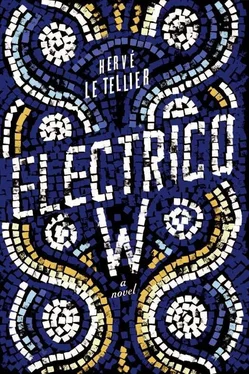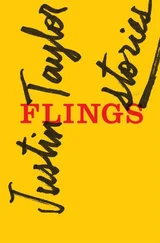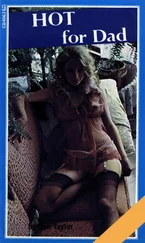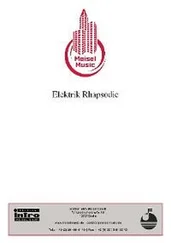Hervé Le Tellier
Electrico W
If I can stop one heart from breaking
I shall not live in vain
If I can ease one life the aching
Or cool one pain
Or help one fainting robin
Unto his nest again
I shall not live in vain.
— EMILY DICKINSON
When I tried taking off the mask,
It stuck to my face.
When I pulled it off and looked in the mirror,
I’d grown older.
— FERNANDO PESSOA
We were heading toward Rossio in a taxi the color of olives, green and black, an ancient Mercedes 220, one of those rounded sedans from the sixties. It was still summer but a gray Atlantic rain was falling and the sky was pewter-colored. Lisbon did not look itself, but the setting may not matter very much. Water streamed over the car window, Antonio gazed out at the city, not concentrating on anything for long. I thought he seemed transparent, absent and present all at the same time — a watermark in the weft of a sheet of paper.
As the taxi slowed to turn into the square by Eduardo VII Park, Antonio took a pack of cigarettes from his pocket and struck a match. He inhaled, sucking in his cheeks, and wound down the window to blow out a scroll of smoke snatched away as we sped along. I mention these insignificant details, not much more than snapshots, because they struck me so emphatically, as did the suffocating smell of sulfur and tobacco.
It felt as if time had taken a step to one side, a divergence as fine as a crack in the glaze on porcelain. Something unfamiliar had insinuated itself inside me. I can think of no other way of putting it: I no longer saw a thirty-year-old man in flesh and blood sitting beside me on that seat with its cracked leather, but a character, a character from a book.
That same evening I made the decision to write it. I didn’t let my ignorance of the plot or framework hold me back. I had no Ariadne’s thread, I just took my big black notebook from my bag and wrote these few sentences, in the past tense, exactly as they appear here, I have left them unchanged.
People will suspect some sort of imposture, a feeble writer’s strategy. They would be wrong: there was actually nothing extraordinary, fascinating, or, in a nutshell, bookworthy about Antonio Flores. Physically he was ordinary, although his brown, almost curly hair tended toward auburn. His dark eyes were mischievous without being playful, and cutting down his forehead between his thick eyebrows he had two vertical lines that gave him an alert expression. His legs looked too short to me, and he seemed more elegant sitting than standing. If he had to walk quickly, a childhood injury made him limp. And yet he had indisputable charm, his own particular way of occupying space, what people call magnetism.
There was nothing predictable or expected about Antonio Flores. Never, in the nine days I spent with him, was I so much as a comma ahead of the sentences that his presence provoked. Never, right up until the collapse, did I guess where Antonio was taking me. He himself knew nothing about this extraordinary phenomenon. His every move conformed to some invisible scheme, and certain silences dictated the beginning of a new paragraph.
So here begins the book. I have revised it — very little, to be honest — as I typed it up. I altered some turns of phrase because they no longer conveyed the exact feeling of the moment in which they were conceived. It was 1985, nearly twenty-seven years ago. At the time I didn’t feel like showing it to publishers. I did give it a title, though, and this morning, with the sun taking its time coming up, it is still called Eléctrico W , the name of a tramline in Lisbon. But that has been a provisional title for so long.
This paragraph is added in because, according to the computer, the manuscript comprised 53,278 words. I wanted it to be a prime number. Out of some superstition. So I added an adjective here, an adverb there, I don’t even remember where. And this is where the notebook starts again.

Just as we reached Rossio Square along the Avenida da Liberdade, it stopped raining, and the Mercedes dropped us at the terrace of a bistro. The chairs were soaked, the table too; we carelessly put our two suitcases down in puddles. As the waiter took our orders, he glanced at our luggage in dismay, or simply indifference.
Antonio and I had never worked together but we had come across each other several times. His photos had illustrated my investigation into the garimpeiros , destitute gold miners in the Orinoco Basin; I’d written a piece to go with his reportage on the tribes of Botswana’s Okavango Delta. When he decided to go back to Lisbon for this particular series of articles, it was his idea to suggest me to his editors. He thought I was still living in Paris, and when he learned that I was now the newspaper’s Portuguese correspondent, he said these words (so odd that they were relayed to me): “I knew his fate would bring him to Lisbon at some point.”
I had only been here a few months. I had wanted to leave Paris, to avoid the risk of bumping into Irene in the corridors of the editorial department, to recover from my absurd love for this girl with her outdated name, this girl who didn’t want me. My father’s death in late June, his suicide — why not use the word — had made up my mind. My brother and I had sold the apartment on the rue Lecourbe, and with my share of the proceeds I had decided to buy a one-bedroom apartment in either the Castelo quarter or Santa Justa, where my mother was born and where I had spent a few holidays as a child. In the meantime, I had rented a studio in São Paulo, right next to the goods port. It was a huge room which afforded few comforts but it was whitewashed and sunny, at the top of a three-story building. It was the views more than anything that had attracted me. From one window you could look out over the roofs, from the other you could see the Tagus. The bed was new and comfortable, and there was a phone line connected. There was a small open-plan kitchen and a shower, but the toilet was in the hallway. “For substantial things …,” the landlady had explained, then, gesturing toward the sink, she chuckled, “but for anything else, okay?” In her view, a refrigerator and two hotplates justified the label studio. The compressor on the fridge made more noise than a factory press, and I soon had to settle for unplugging it at night.
I had hung my only picture on the wall, and that was just a dog-eared, yellowed copy of a late-nineteenth-century map of the Okavango Delta. I had set up my desk in a corner, which was blocked on one side. I put my fax on it and this cube-shaped computer with its small black-and-white screen, whose successors I could never have imagined. Sitting there, I could look through the window to my right and see the docks. On nights when I couldn’t sleep, in other words almost every night, I found their rumblings comforting. I left one window open and listened to the thunder of heavy diesel engines and fuel pumps, and the workers’ cries and laughter. Sometimes I got up before dawn and wandered through the steely sadness of static and traveling cranes. Living in the entrails of a port felt nostalgic and reassuring, like those English paintings of industrial landscapes, all in grays and blues. And Lisbon, a capital open to the seas, seemed to blend exoticism with civilization.
I had set myself two tasks for the imminent autumn: to finish the novel about Pescheux d’Herbinville for which I had only written a few pages and chosen a title ( The Clearing ), then to translate Jaime Montestrela’s Contos aquosos , the collection of bizarre short stories that he subtitled Atlas inutilis . Montestrela was far from well known, but at a secondhand bookstall in the Alfama neighborhood I had stumbled across a copy of his Contos and was instantly drawn to the whiff of dark humor they gave off. It was a thick volume, but these ironic and fantastical short stories were barely a few lines long, with a darkness reminiscent of Max Aub or Roland Topor. Out of almost a thousand, I had already translated about a hundred. Here is the first one I chanced on, the day I happened to open the book. It is a pretty good illustration of Montestrela’s mindset:
Читать дальше













